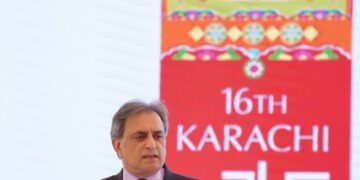Afghanistan’s all-powerful Defence Minister Mullah Yaqub, son of Taliban founder Mullah Omar, recently expressed the Taliban’s willingness to send Afghan army personnel to India for military training, saying they “don’t have any issue with it”. As reported by the Express Tribune, Mullah Yaqub said, “We want good and cordial relations with India and we hope that India would reciprocate and maintain good relations in many aspects with us.”
A close ally of consecutive Afghan govts that had been fighting the Taliban with the help of the US, India kept supporting the so-called “Northern Alliance”, continuing this support even Northern Alliance 2.0 raised its head briefly in the wake of the Taliban victory and occupation of Kabul in August 2021. Supporting Karzai, Ghani and the US over the twenty years of “the never-ending war” in Afghanistan, India was never on talking terms with the Taliban.
The human cost that Pakistan has suffered for supporting the Afghan people has been nothing less than terrible. Hundreds of Pakistan Army soldiers and civilian’s sacrificed their lives for these thankless Afghans. Upto 2018 over 65000 civilians had been killed in Pakistan including more than 9000 security personnel dead. Over 100000 civilians have been injured, nearly 15000 soldiers seriously. The cumulative economic impact of war in Afghanistan over the last forty years lies mainly in lower growth rate in all major sectors of economy. Normal economic and trade activities got disrupted or became more expensive which led to Pakistani business losing its share in export due to disruption in business cycles and supply line disruption. According to an estimate for the FY 2013-4 and 2014-5 the financial loss of Pakistan amounted to US$ 11.2 billion. For the aggregated period 2001 to 2015 there has been an estimated loss of US$ 107 billion according to the Ministry of Finance of Pakistan. Arab News reported last year that the country suffered more than $150 billion in economic losses in the past 20 years after allying with the US as a frontline state in the wake of the Sept. 11, 2001 attacks. One can safely count the accumulated loss to Pakistan amounting to approximately US$ 125 billion.
Pakistan gave refuge to millions of Afghans, allowing them not only to stay but also do business, this upset the Pakistani economy in no small way. Today Karachi is the second largest Afghan city after Kabul. Increasing ethnic strife made thousands of Pakistanis jobless. While caring for the wounded in our hospitals, Pakistan allowed the Taliban elite and their families a safe haven in Peshawar and Quetta. Apart from the economic woes and the ethnic strife Pakistani Taliban received support from the Afghans and a wave of extremist ideology and terrorism swept our country. It took years of intense efforts and sacrifice by the Pakistan Army and other security forces to curb extremism and terrorism. As the latest terrorist acts – organized and financed with the help of India – in Balochistan and Karachi show, it is not yet done.
To quote my article “Out-of-Box Security Measures” of Sep 3, 2021, “our western borders may temporarily cease being hostile, simmering hostility by disparate groups inimical to Pakistan will persist. Consequently the evoking of dormant activists within Pakistan cannot be ruled out. We must retain credible deterrence capability for both the Eastern and Western fronts. The difference between the two fronts is in the nature of the threats. Notwithstanding the four decades long proxy war conducted by India using different players with Afghanistan as a platform, viz first the Soviet Union 1980-1990 and the US 2000-2021, the Eastern front demands capability to handle the full and broad spectrum of conventional threat”, unquote. In the process of supporting our Afghan “brethrens” Pakistani infrastructure was damaged and our political system was destabilized. When the US and NATO powers finally had to leave Afghanistan in August 2021 it was Pakistan that offered evacuation routes and safe havens. Pakistan decided in the interest of regional peace to support the new Taliban govt., opened trade routes and shared food and other aid with them to prevent the Afghans from dying from hunger. Together with Russia and China we gave the Taliban govt the benefit of doubt when they killed our soldiers who were fencing the Pakistan-Afghan border over which terrorists came to kill Pakistanis and destroy our assets. Even then the Taliban govt is giving refuge to Pakistani terrorists who keep using Afghan soil against our country.
From day one of its existence the current Taliban govt has put Pakistan in a difficult situation internationally. As it is we have suffered an image problem internationally for our tacit support over three decades. By international perception we support a govt that discriminates against ethnic minorities, prevents women and girls from access to education and makes them wear shuttlecock burqas in public. The insistence of the Taliban on Pashtun cultural traits that have no basis in Islam is supporting and instigating reactionary social forces in our own population.
Decades of silence towards the Taliban resulted in India’s complete loss of foothold in Afghanistan once the Taliban took over in August 2021. This year in June a team of Indian officials met the Acting Foreign Minister of Afghanistan to discuss” bilateral ties and humanitarian aid”. The obvious goal of this visit was to get the Indian foot back into the Afghan door and the result of those talks – despite of what the media want us to believe – the talks did not center on humanitarian help alone but resulted in the quoted remark of the Afghan FM that military cooperation in the form of Afghan soldiers receiving training in India was a completely feasible option. Thus, obviously India is interested in regaining its military position and influence across the western border of Pakistan while trying to undo Pakistani influence there. One really wonders what the Indians have offered to get this.
The teachings of their great-grandfather Kautilya has obviously fallen on fertile ground with the Taliban and should not remain without consequence for Afghanistan from the Pakistani side. Enough efforts of ours have been misused and enough patience has been displayed by us. The proposed (or decided?) Afghan military cooperation with India should not remain without a proper response. Our answer should include the closing of transit routes for Indian goods, a strict control preventing food from being exported to or smuggled into Afghanistan especially in the face of looming food scarcity in our own country. Borders to Afghanistan being closed would probably also help our fight against TTP attacks from Afghan soil. Afghan refugees in Pakistan should be contained in camps and not allowed to roam around freely in the country. The Pakistani generosity in condoning TTP in Afghanistan by the Taliban govt has to end. We cannot afford appeasing and/or mollycoddling the most ungrateful nation on this Earth anymore!



















